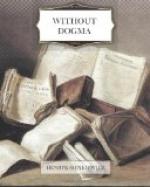Father Calvi, my first tutor and at the same time a great judge of Roman antiquities, gave him the final impulse towards investigation of the Eternal City. Some fifteen years ago my father became acquainted and subsequently on terms of friendship with the great Rossi, in whose company he spent whole days in the catacombs. Thanks to his extraordinary gifts he soon acquired such consummate knowledge of Rome as to astonish Rossi himself. Several times he began writing treatises on the subject, but never finished what he had begun. Maybe the completion of his collections took up too much of his time, but most likely the reason he will not leave anything behind him except his collections is that he did not confine himself to one epoch or any specialty in his researches. Gradually mediaeval Rome began to fascinate him as much as the first era of Christianity. There was a time when his mind was full of Orsinis and Colonnas; after that he approached the Renaissance, and was fairly captivated by it. From inscriptions, tombs, and the first traces of Christian architecture he passed to nearer times; from the Byzantine paintings to Fiesole and Giotto, from these to artists of the fourteenth and fifteenth centuries, and so on; he fell in love with statues and pictures; his collections certainly increased, but the great work in Polish about the three Romes remained forever in the land of unfulfilled intentions.
As to these collections my father has a singular idea. He wants to bequeath them to Rome under the condition they should be placed in a separate gallery named after him, “Museum Osoria Ploszowski.” Of course his wishes will be respected. I only wonder why my father believes that in doing this he will be more useful to his community than by sending them to his own country.
Not long ago he said to me: “You perceive that scarcely anybody there would see them, and very few derive any benefit, whereas here the whole world can study them, and every individual that benefits thereby carries the benefit to other communities.” It does not befit me to analyze how much family pride and the thought of having his name engraved in marble in the Eternal City has to do with the whole scheme. I almost think that such must be the case. As to myself, I am perfectly indifferent where the collections are to remain. But my aunt, to whom by the bye I am shortly going to pay a visit at Warsaw, is very indignant at the idea of leaving the collections out of the country, and as, with her, thought and speech go always together, she expresses her indignation in every letter. Some years ago she was at Rome, and they wrangled every day over the matter, and would have quarrelled outright had not the affection she has towards me subdued her temper.




